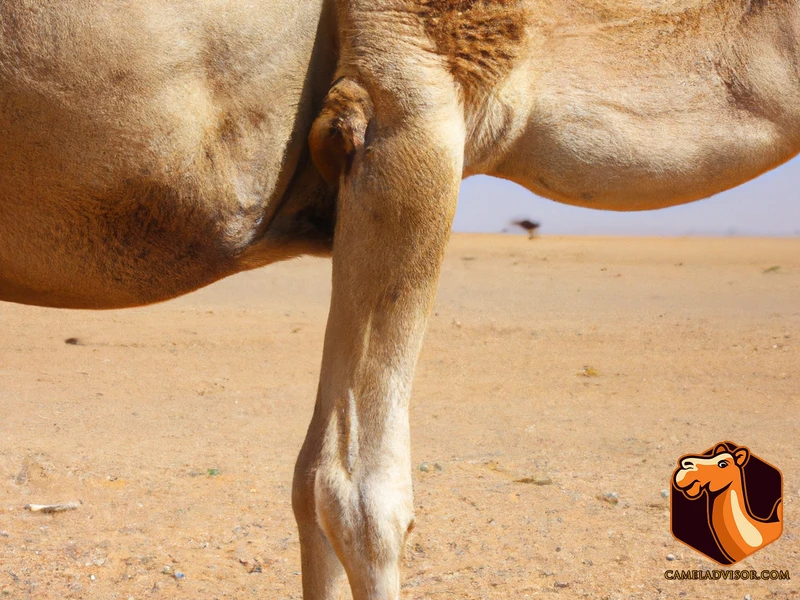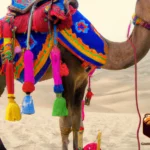The gestation period of camels has been a topic of fascination for researchers and animal enthusiasts alike. This period typically lasts between 13 to 14 months, but there have been instances where the gestation period has lasted up to 15 months. Despite extensive research, there is still much to be learned about the factors that affect the gestation period of camels. This article will explore some of the most significant factors that can impact the gestation period of camels, as well as best practices for managing a successful camel pregnancy.
Contents
- Factors affecting gestation period
- Management of gestation period
- Conclusion
-
Frequently Asked Questions
- What is the average gestation period for camels?
- Are there any factors that can cause a variation in the gestation period of camels?
- How does nutrition affect gestation period in camels?
- Can genetics affect gestation period in camels?
- How do environmental conditions affect gestation period in camels?
- What to expect during veterinary check-ups for pregnant camels?
- How should a pregnant camel be fed and hydrated?
- What are the signs of a healthy pregnancy in camels?
- What are some signs of labor in camels?
- Can complications arise during labor in camels?
- References
Factors affecting gestation period

As one of the most well-known and fascinating animals in the world, camels have long been a subject of interest for scientists and researchers. One aspect of their biology that has intrigued experts for many years is their gestation period. Understanding the factors that affect the length of time between conception and birth in camels is crucial for both scientists and animal caretakers alike. From the impact of proper nutrition and genetics to environmental conditions, various factors have been found to play a role in this phenomenon. Ultimately, gaining knowledge about these factors could help improve the care and management of pregnant camels.
Nutrition
Proper nutrition is essential during gestation period (pregnancy) in camels. A well-balanced diet is important to ensure the healthy growth and development of the fetus. Undernutrition or malnutrition can result in a longer gestation period, lower birth weight, and increased risk of health issues for both the mother and the calf.
Camels require a diet that is high in fiber, protein, and minerals. During pregnancy, their nutritional requirements increase significantly. The table below shows the essential nutrients required by camels during gestation period, and their function in the body of the mother and developing fetus.
| Nutrient | Function | Sources |
|---|---|---|
| Protein | Building blocks for fetal growth and development; maintenance of maternal tissues | Legumes, alfalfa, soybean meal, cottonseed meal, blood meal, fish meal, and poultry by-products |
| Fiber | Improving gut health; maintaining digestive processes; reducing risk of digestive disorders | Hay, grasses, silage, and other fibrous feeds |
| Energy | Providing the necessary calories for fetal growth and development; maintaining maternal tissues | Grains, hays, and other energy-rich feeds |
| Minerals (calcium, phosphorus, magnesium, zinc, copper) | Development of fetal bones and teeth; preventing the risk of mineral deficiencies in the mother | Bone meal, mineral blocks or licks, and other mineral supplements |
| Vitamins (A, D, E, K, B vitamins) | Elevated levels of certain vitamins such as vitamin A are crucial for the proper development of the fetal eyes, skin, and immune system | Green leaves, vegetables, and commercial vitamin supplements |
It is important to note that feeding pregnant camels with excessive amounts of feed, especially grains, can lead to obesity, which can also cause complications during pregnancy and delivery. Pregnant camels should be provided with a balanced diet in the right amounts, based on their body condition, stage of pregnancy, and individual needs.
Proper nutrition during gestation period is crucial for the health and wellbeing of the mother and developing fetus. For more information on the adaptations that pregnant camels undergo, visit pregnant camels adaptations. Also, see how camel milk positively affects gestation period at camel milk gestation. It’s important to manage health issues that can arise during this period, which are described in camel pregnancy health issues.
Genetics
Genetics plays a crucial role in determining the gestation period of camels. Several studies have shown that the breed of camel and the genetic makeup of the individual animal can affect the length of their pregnancy. Strong maternal genes can lead to a longer gestation period, while weak genes might result in a shorter duration of pregnancy.
Research has shown that the genetics of the male camel can also influence the gestation period of the female. Male camels with strong genes can sire offspring with longer gestation periods, while males with weaker genes tend to yield offspring with shorter gestation periods. Mishandling of breeding can lead to interbreeding and a decline in the genetic makeup of the offspring.
The table below highlights the impact of genetics on the gestation period in camels:
| Genetic Factors | Effect on Gestation Period |
| Inheritance of maternal genes | Affects the length of the gestation period |
| Inheritance of paternal genes | Affects the gestation periods of offspring |
| Interbreeding | Causes a decline in genetic makeup |
It is essential to maintain genetic diversity and select the right breeding practices to ensure the healthy and successful gestation of camels. By maintaining strong genetics, breeders can help ensure the best possible outcome for their camels during pregnancy. To learn more about the stages of pregnancy in camels, please see our article on the stages of pregnancy in camels.
Environmental Conditions
Environmental conditions can also play a crucial role in the gestation period of camels. The table below outlines some of the key environmental factors that can affect the length of a camel’s gestation period:
| Environmental Factor | Effect on Gestation Period |
| Temperature | Extreme temperatures, both hot and cold, can lead to stress on the mother camel, potentially resulting in a longer gestation period. |
| Humidity | High levels of humidity can also cause stress on the mother camel, leading to a longer gestation period. |
| Altitude | Camels living at high altitudes may have longer gestation periods due to decreased oxygen levels. |
| Seasonal changes | Changes in weather and availability of food can impact the gestation period of camels. |
| Predators | Camels living in areas with high predator populations may experience stress, leading to a longer gestation period. |
| Noise pollution | Excessive noise can cause stress on pregnant camels and potentially lead to a longer gestation period. |
It is important for camel owners to carefully consider the environmental conditions in which their camels are living and make adjustments as necessary to ensure a healthy and timely gestation period. Providing adequate shelter, keeping predators at bay, and minimizing noise pollution are all important steps that can be taken to support a healthy pregnancy and a timely birth.
Management of gestation period
During gestation, camels require special care and attention to ensure they carry their young to full term and deliver healthy offspring. Proper management during this period is crucial to minimizing the risk of complications that could arise from inadequate care. In this section, we will discuss several measures that can be taken to manage the gestation period effectively. Through regular veterinary check-ups, appropriate feeding and hydration, and monitoring behavior and signs, camel owners can ensure a successful pregnancy and a healthy birth.
Regular veterinary check-ups
Regular veterinary check-ups are an essential part of managing the gestation period for camels. It is important to have a skilled and experienced veterinarian who can monitor the health of the pregnant camel and provide necessary care. The table below highlights the importance of regular veterinary check-ups during the gestation period.
| Importance of Regular Veterinary Check-ups |
|---|
| Detection of Health Issues: Regular check-ups can help detect any health issues that may arise during the gestation period. Early detection can lead to timely treatment and help prevent further complications. |
| Monitoring Pregnancy: A veterinarian can monitor the progress of the pregnancy through regular check-ups. This includes monitoring the growth and development of the fetus, as well as the health of the mother. |
| Preparation for Parturition: A veterinarian can provide guidance and advice on how to prepare for parturition, including the signs and symptoms that should be monitored, and any necessary interventions that may be required. |
| Prevention of Disease: Regular check-ups can also help prevent disease by ensuring that the camel is up-to-date on vaccinations and deworming. This helps to keep the mother and fetus healthy throughout the gestation period. |
Regular veterinary check-ups are an important aspect of managing the gestation period for camels. It allows for earlier detection of any issues, monitoring of the pregnancy, preparation for parturition and prevention of disease. A skilled and experienced veterinarian can provide necessary care and ensure the health and well-being of both the mother and fetus.
Proper feeding and hydration
One of the key factors in ensuring a healthy gestation period for camels is proper feeding and hydration. This is critical for the health of both the mother and the developing fetus. Camels require a diet that is high in roughage, including grasses and hay, as well as fresh water.
To ensure that camels receive adequate nutrition and hydration during gestation, it is important to provide a balanced and varied diet. This can include feeding them a mix of roughage and concentrate feeds, such as grains and pellets, as well as supplementing their diet with vitamins and minerals as necessary.
In addition to providing the right balance of nutrients, it is also important to monitor feed intake and adjust the diet as needed. Pregnant camels may require additional feed and water during the later stages of gestation, and feeding regimens may need to be adjusted accordingly.
In order to avoid dehydration, camels must have access to clean and fresh water at all times. During gestation, it is particularly important to ensure that their water intake is monitored and that they have access to water sources that are free from contaminants.
Overall, proper feeding and hydration are critical factors in ensuring a healthy gestation period and the birth of a healthy calf. By providing a balanced diet that meets their nutritional needs and monitoring their hydration levels, camel breeders can help ensure a successful and stress-free gestation period.
Monitoring behavior and signs
During the gestation period of camels, it is essential to monitor their behavior and signs to ensure the health and well-being of both the mother and the developing fetus. Some crucial indicators must be observed to detect any possible complications and provide timely interventions. Here are some key behaviors and signs that should be closely monitored throughout the entire gestation period:
- Appetite: A decrease in appetite, particularly in the last trimester, could be a sign of impending labor. On the other hand, increased appetite could be a symptom of a higher energy requirement by the pregnant camel, which needs to be addressed promptly.
- Movement: The movement of the fetus can be felt during the latter part of the gestation period. The frequency and intensity of fetal movement can indicate the well-being of the fetus. Any decrease or increase in fetal movement may be an indication of a problem that needs intervention.
- Weight gain: Pregnant camels gain weight gradually throughout the gestation period. A sudden weight loss could be a sign of a problem, while sudden increase could indicate the need for adjustments in feeding or other management practices.
- Vaginal discharge: A small amount of discharge is normal during pregnancy, while a significant or abnormal discharge could indicate an infection or other issues that require veterinary assistance.
- Signs of discomfort: Signs such as restlessness or reluctance to move could be signs of discomfort, possibly due to pain or other issues.
By keeping a close eye on the behaviors and signs of the pregnant camel, caretakers can quickly detect any problems that require intervention, thus ensuring a healthy and successful gestation period. Any concerns should be reported promptly to a qualified veterinarian for further evaluation and treatment.
Conclusion
In conclusion, the gestation period of camels is affected by various factors, including nutrition, genetics, and environmental conditions. It is important for camel breeders to understand these factors and take appropriate measures to manage the gestation period effectively.
Proper nutrition is essential for the health and well-being of pregnant camels, and it can affect the length of the gestation period. Camel breeders should ensure that their animals are fed a balanced diet that meets their nutritional needs.
Genetics also play a significant role in the gestation period of camels. Some breeds of camels may have longer gestation periods than others, and it is important to consider this when breeding animals.
Environmental conditions, such as temperature and humidity, can also affect the gestation period of camels. Camel breeders should ensure that their animals are kept in a comfortable and stress-free environment to minimize the risk of complications.
Managing the gestation period of camels is crucial for the health and safety of both the mother and her offspring. Regular veterinary check-ups, proper feeding and hydration, and monitoring behavior and signs are all important steps in managing the gestation period effectively.
In summary, understanding the factors affecting gestation period in camels and implementing proper management practices can help ensure successful breeding and healthy offspring. Camel breeders should prioritize the health and well-being of their animals to ensure a successful breeding program.
Frequently Asked Questions
What is the average gestation period for camels?
The average gestation period for camels is around 13 months.
Are there any factors that can cause a variation in the gestation period of camels?
Yes, several factors can cause a variation in the gestation period of camels, including nutrition, genetics, and environmental conditions.
How does nutrition affect gestation period in camels?
A camel’s diet plays a crucial role in determining its gestation period. A diet deficient in essential nutrients can lead to miscarriages or prolonged gestation.
Can genetics affect gestation period in camels?
Yes, genetics plays a significant role in determining the gestation period in camels. Some breeds may have longer gestation periods than others.
How do environmental conditions affect gestation period in camels?
Extreme temperatures and harsh environmental conditions can put stress on pregnant camels, leading to a prolonged gestation period or miscarriage.
What to expect during veterinary check-ups for pregnant camels?
During veterinary check-ups, a veterinarian may perform ultrasounds and blood tests to monitor the health of the fetus and the mother. They may also make recommendations regarding diet and exercise.
How should a pregnant camel be fed and hydrated?
A pregnant camel should be fed a nutritious diet with adequate amounts of protein, carbohydrates, and minerals. It is also essential to provide clean drinking water and ensure the camel is adequately hydrated.
What are the signs of a healthy pregnancy in camels?
A healthy pregnancy in camels is characterized by a strong appetite, normal fecal output, and good hydration levels. The pregnant camel will also show signs of weight gain and have healthy-looking skin and coat.
What are some signs of labor in camels?
Signs of labor in camels may include restlessness, udder swelling and secretion, and the appearance of colostrum in the milk. Camels may also appear uncomfortable, frequently standing and lying down.
Can complications arise during labor in camels?
Yes, some common complications during labor in camels include dystocia, stillbirth, and retained fetal membranes. It is essential to have a veterinarian present during the delivery to monitor the health of the mother and the newborn calf.







